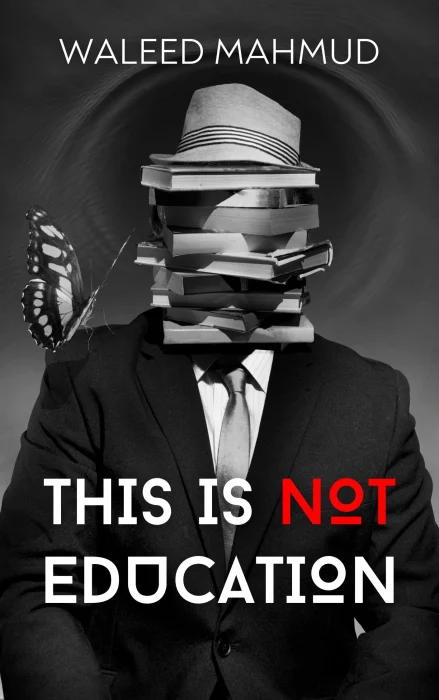The Perils of Patriotic Pride
Patriotism is often hailed as a noble virtue, a sign of unwavering loyalty and love for one’s country. But beneath the surface of this seemingly positive sentiment lies a darker reality. The patriotic sense of pride, while seemingly harmless, is a recipe for division, hindering progress, and perpetuating harmful ideologies. In this bipolar world, there is a dire need to examine ideas that cause dissent among us. We need to talk about the various ways in which these abstract ideas can be detrimental, challenging conventional notions.

Patriotism breeds an Illusion of Superiority
One of the most insidious aspects of patriotic pride is the illusion of national superiority that it breeds. Patriotism often involves the belief that one’s country is inherently better than others for no other reason except that ‘I was born here!’. This sense of superiority can lead to xenophobia, racism, and a refusal to acknowledge the flaws within one’s own nation.
In my book Power & Ethics, I discuss how such beliefs can justify unethical actions and policies. When a nation views itself as superior, it often feels entitled to impose its values and systems on others, disregarding the autonomy and cultures of other nations. This can lead to imperialism, colonialism, and a host of other injustices. (I’m sure you can think of many examples here!)
The notion of national superiority also stifles critical self-reflection. Instead of striving to improve, a nation consumed by patriotic pride may ignore its shortcomings, believing that it is already the best. This can hinder progress and perpetuate systemic issues such as inequality, corruption, and human rights abuses.
Divide and Conquer!
Patriotism can create an “us versus them” mentality, creating division both within and between nations. This divisive mindset can lead to internal conflicts, as different groups within a country vie for dominance and recognition. It can also escalate international tensions, as nations compete for power and resources.
In Decrypting Globalization, I explore how globalization has blurred the lines between nations, creating a more interconnected world. However, patriotic pride often resists this interconnectedness, clinging to outdated notions of sovereignty and nationalism. This resistance can hinder international cooperation and exacerbate global challenges such as climate change, economic inequality, and political instability.
Moreover, patriotic pride can fuel militarism and the glorification of war. National pride often involves a reverence for military achievements and a willingness to defend the nation at all costs. This can lead to an aggressive foreign policy, unnecessary conflicts, and a disregard for diplomacy and peaceful resolutions.
The Suppression of Dissent
Patriotic pride can also suppress dissent and stifle free speech. In a nation where patriotism is held as the highest virtue, those who criticize the government or question national policies may be labeled as unpatriotic or even traitorous. This creates an environment where critical voices are silenced, and genuine concerns are dismissed.
In Probing Freewill, I discuss the importance of free speech and open dialogue in a healthy society. A true democracy thrives on the exchange of ideas and the ability to challenge authority. However, patriotic pride can undermine these democratic principles, leading to authoritarianism and the erosion of civil liberties.
The suppression of dissent not only harms individuals but also weakens the nation as a whole. Without critical voices, a country cannot identify and address its flaws. This can lead to stagnation, as issues such as corruption, inequality, and injustice go unchallenged and unresolved.
The Perils of Blind Loyalty
Blind loyalty to one’s country, often encouraged by patriotic pride, can lead to the acceptance of unethical actions and policies. When citizens are taught to prioritize national loyalty above all else, they may support actions that are harmful or unjust simply because they are framed as being in the nation’s best interest.
In Power & Ethics, I explore how blind loyalty can lead to a dangerous conformity, where individuals are unwilling to question or oppose harmful policies. This can result in the perpetuation of violence, discrimination, and other injustices. True ethical behavior requires the ability to think critically and act according to moral principles, even when it means challenging one’s own country.
Blind loyalty can also lead to the marginalization of minority groups. Patriotic pride often involves a narrow definition of what it means to be a true citizen, excluding those who do not fit this definition. This can result in discrimination and oppression, as minority groups are seen as less loyal or less deserving of rights and protections.
The Impact on Global Citizenship
In an increasingly interconnected world, the concept of global citizenship is becoming more important. Global challenges such as climate change, pandemics, and economic inequality require cooperation and solidarity across national borders. However, patriotic pride can hinder the development of a global perspective.
In Decrypting Globalization, I discuss the need for a shift from nationalistic thinking to a more inclusive, global mindset. Patriotic pride often involves a focus on national interests, which can conflict with the needs of the global community. For example, a nation consumed by patriotic pride may prioritize its own economic growth over the environmental well-being of the planet, contributing to global environmental degradation.
To address global challenges effectively, we must cultivate a sense of global citizenship that transcends national borders. This involves recognizing our shared humanity and working together to create a more just and sustainable world. Patriotic pride, with its focus on national superiority and division, is fundamentally at odds with this vision.

Reimagining Patriotism
While the traditional sense of patriotic pride can be harmful, it is possible to reimagine patriotism in a way that promotes unity, progress, and ethical behavior. This involves shifting from a focus on national superiority to a more inclusive and compassionate understanding of patriotism.
One approach is to adopt a form of “critical patriotism” that acknowledges and addresses the flaws within one’s country. Critical patriotism involves a commitment to improving the nation and working towards justice and equality for all citizens. It requires the ability to love one’s country while also recognizing its shortcomings and striving for positive change.
Another approach is to expand the concept of patriotism to include global citizenship. This involves recognizing that our responsibilities extend beyond national borders and that we have a duty to contribute to the well-being of the global community. By fostering a sense of solidarity with people from other nations, we can work together to address global challenges and create a more just and sustainable world.
Education and Critical Thinking
Education plays a crucial role in reimagining patriotism and promoting a more inclusive and ethical worldview. By teaching critical thinking skills and encouraging open dialogue, we can empower individuals to question harmful ideologies and make informed decisions.
Education plays a central role in developing autonomy and ethical behavior. A well-rounded education should include not only knowledge of history and current events but also an understanding of ethical principles and the ability to think critically about complex issues.
By promoting critical thinking and ethical reasoning, we can counteract the harmful effects of blind patriotism and encourage a more thoughtful and compassionate approach to national and global issues. This involves creating educational environments that value diversity, inclusivity, and the free exchange of ideas.
The Role of Media
The media also plays a significant role in shaping public perceptions of patriotism. Sensationalist and nationalist media can perpetuate harmful stereotypes and fuel division. However, the media also has the power to promote a more nuanced and inclusive understanding of patriotism.
Journalists and media organizations can contribute to this effort by highlighting stories of positive change and collaboration, both within and between nations. By focusing on the common humanity that unites us, rather than the differences that divide us, the media can help foster a sense of global citizenship and solidarity.
Moreover, media literacy programs can empower individuals to critically evaluate the information they consume and recognize bias and propaganda. By developing these skills, individuals can resist the influence of nationalist media and make more informed decisions about national and global issues.
Personal Responsibility
Ultimately, reimagining patriotism requires personal responsibility and a commitment to ethical behavior. Each individual has the power to challenge harmful ideologies and contribute to a more just and inclusive society.
This involves examining our own beliefs and biases and being willing to change when necessary. It requires the courage to speak out against injustice, even when it is unpopular or difficult. By taking responsibility for our actions and striving to live according to ethical principles, we can create a more compassionate and equitable world.
While patriotic pride is often seen as a positive and noble sentiment, it can have harmful consequences. By creating division, suppressing dissent, and promoting blind loyalty, traditional forms of patriotism can hinder progress and perpetuate injustice. However, by reimagining patriotism in a more inclusive and ethical way, we can promote unity, progress, and global citizenship. Through education, media, and personal responsibility, we can challenge harmful ideologies and work towards a more just and sustainable world.

